The AMD 3rd Gen Ryzen Deep Dive Review: 3700X and 3900X Raising The Bar
by Andrei Frumusanu & Gavin Bonshor on July 7, 2019 9:00 AM EST** = Old results marked were performed with the original BIOS & boost behaviour as published on 7/7.
Benchmarking Performance: CPU Legacy Tests
3DPM v1: Naïve Code Variant of 3DPM v2.1
The first legacy test in the suite is the first version of our 3DPM benchmark. This is the ultimate naïve version of the code, as if it was written by scientist with no knowledge of how computer hardware, compilers, or optimization works (which in fact, it was at the start). This represents a large body of scientific simulation out in the wild, where getting the answer is more important than it being fast (getting a result in 4 days is acceptable if it’s correct, rather than sending someone away for a year to learn to code and getting the result in 5 minutes).
In this version, the only real optimization was in the compiler flags (-O2, -fp:fast), compiling it in release mode, and enabling OpenMP in the main compute loops. The loops were not configured for function size, and one of the key slowdowns is false sharing in the cache. It also has long dependency chains based on the random number generation, which leads to relatively poor performance on specific compute microarchitectures.
3DPM v1 can be downloaded with our 3DPM v2 code here: 3DPMv2.1.rar (13.0 MB)
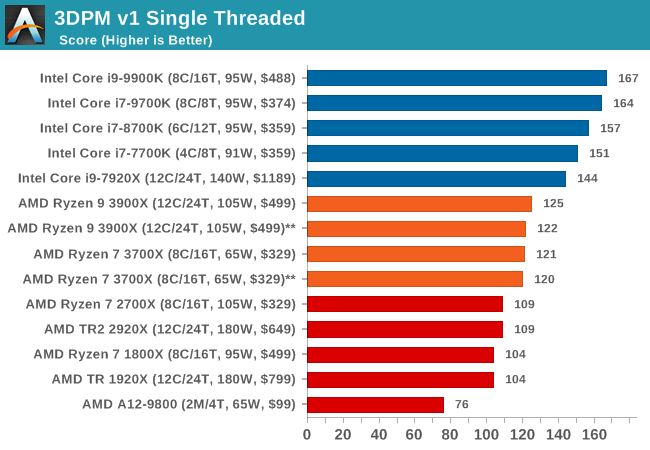
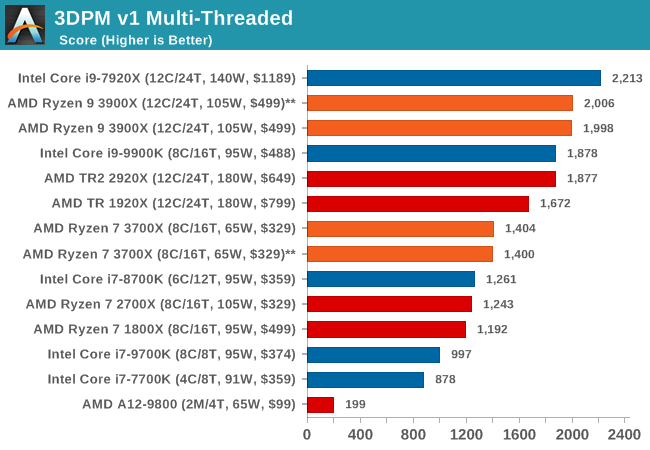
x264 HD 3.0: Older Transcode Test
This transcoding test is super old, and was used by Anand back in the day of Pentium 4 and Athlon II processors. Here a standardized 720p video is transcoded with a two-pass conversion, with the benchmark showing the frames-per-second of each pass. This benchmark is single-threaded, and between some micro-architectures we seem to actually hit an instructions-per-clock wall.
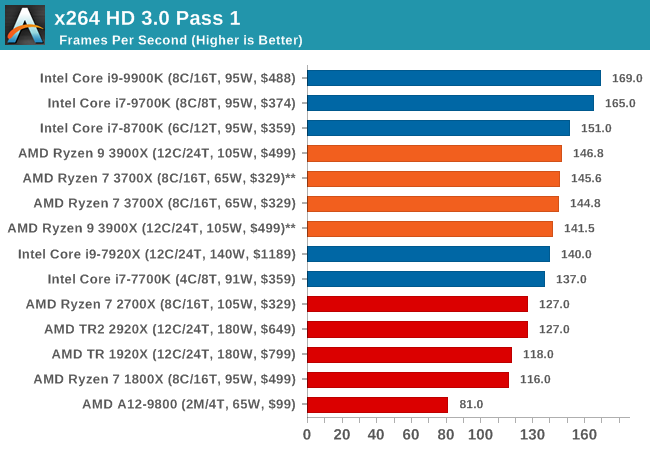
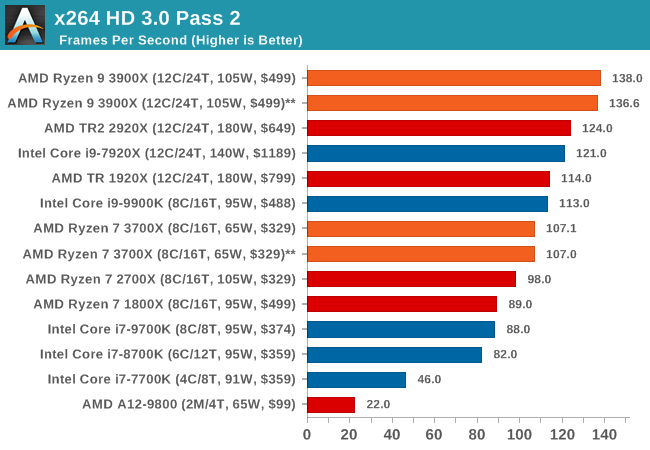
CineBench 11.5 and 10
Cinebench is a widely known benchmarking tool for measuring performance relative to MAXON's animation software Cinema 4D. Cinebench has been optimized over a decade and focuses on purely CPU horsepower, meaning if there is a discrepancy in pure throughput characteristics, Cinebench is likely to show that discrepancy. Arguably other software doesn't make use of all the tools available, so the real world relevance might purely be academic, but given our large database of data for Cinebench it seems difficult to ignore a small five minute test. We run the modern version 15 in this test, as well as the older 11.5 due to our back data.
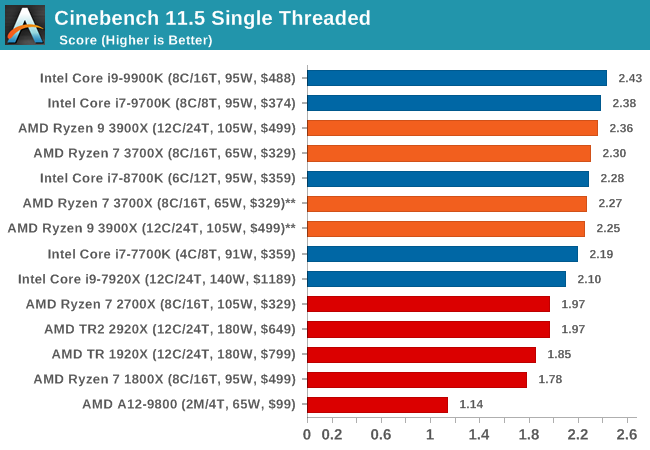
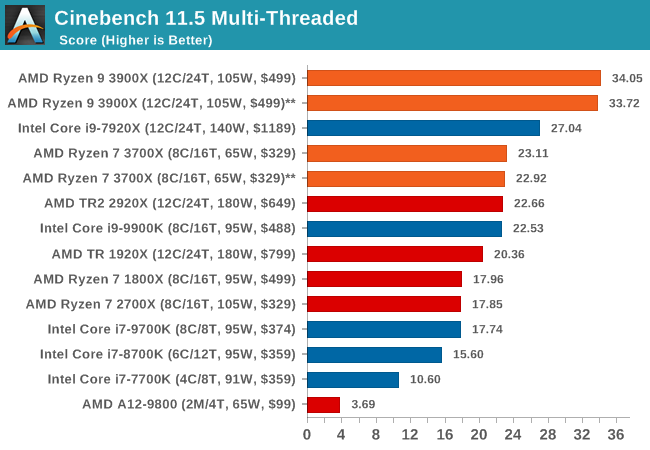










447 Comments
View All Comments
Irata - Monday, July 8, 2019 - link
Thanks for your reply Ryan. I did not intend to be rude when saying "lazy" but rather show that I do not think this is something that was done by intent.Like I said - mention these things and it helps clear up misunderstandings.
It is definitely very positive that you test the Ryzen CPU with the latest builds though.
I also like that you mention if prices include an HSF or not, but it would have been nice to mention the price of HSF used for Intel systems (when not boxed), as e.g. the Thermalright True Copper is a rather expensive CPU cooler.
I think you already addressed not using a faster nVME drive (a PCIe 4 version would have been ideal if available - this would also have given an indication of potentially increased system power use for the Ryzen with PCIe 4 drives) on Twitter.
Those are little nitpicks, so not intended to be a criticism of the overall article. It is just that people tend to be rather sensitive when it comes to Intel vs. AMD CPU comparisons, given Intel's history of things they are willing to do to keep mind- and marketshare.
Daeros - Monday, July 15, 2019 - link
Whether or not it is intentional, AT has had an increasing Intel bias over the last several years. Watch to see how long it takes for an AMD article to get pushed down by rumors or vaporware from Intel or Nvidia.rarson - Monday, July 8, 2019 - link
I think Ryan brings up several salient points, and whether or not you think that they did or did not have the time to do what you wanted (they were also a man down without Dr. Cuttress), the fact of the matter is that AMD dropped a bunch of CPUs and GPUs all at once and literally everyone was scrambling to do what they could in order to cover these launches.I don't think it's coincidence that even in the tech Youtube space, if you watch 10 different reviews you'll largely see 10 different testing methodologies and 10 (somewhat) different results. Every single reviewer I've talked to said that this was one of, if not the most, difficult launch windows they've ever dealt with. Additionally, launching on a weekend with all of its associated complications (not just on reviewers' ends, but partners as well) is a bitch, with everyone scrambling at the last minute on their days off getting in last-minute updates and whatnot.
When AMD tells you at the last minute, "Oh, the brand new Windows 10 update includes something new" you don't necessarily have time to go back and redo all the benchmarks you had already done on the Intel platform.
TL;DR while there may have been flaws in some of the testing, take the details with a grain of salt and compare them to the myriad of other reviews out there for a better overall picture if necessary.
Irata - Tuesday, July 9, 2019 - link
You are making a good point and unfortunately this was an - unfortunately - typical AMD CPU launch with things still being beta. I would assume testers are none too happy about having to re-do their tests.What I don't get from AMD (even if (and that's a capital IF) it's not their fault, it's their responsibility) is how they cannot see how this makes their products appear in a less favorable light. Let's say the buggy bios cost them 5%, the conclusion with a 5% better performance would have been even more in Ryzen 3000's favor.
It's a bit like showing up to a job interview wearing the clothes you wore for the previous day's physical activity.
Daeros - Monday, July 15, 2019 - link
Lazy isn't in it. Intentionally misleading is more like it. On one page, where AMD wins more than it looses in the charts, out of 21 paragraphs, 2 had something positive to say about AMD or Ryzen 3k without following up with something along the lines of "but we know Intel's got new tech coming, too"Ryan Smith - Monday, July 8, 2019 - link
To be sure, they're still valid. The patches for Fallout and ZombieLoad are not out yet (I only mention them because the vulnerabilities have already been announced).RSAUser - Monday, July 8, 2019 - link
They've been out since 14 May, what are you talking about?djayjp - Monday, July 8, 2019 - link
Don't forget RIDLMeteor2 - Sunday, July 14, 2019 - link
RIDL and Zombieload are the same thing.Yes, the Intel CPUs should have been re-benchmarked on 1903, updated after 14 May when the OS-side fixes for the new MDS-class flaws were released. That's only fair and it's quite reasonable to expect that users will apply security updates, not leave their systems unpatched and vulnerable for perhaps a percent or two of performance.
FireSnake - Monday, July 8, 2019 - link
Ryan: how is this not explained in the article? I am reading this site for more then a decade and I trust you most. and I trust you will provide such information. I would expect, you update the article with this info.